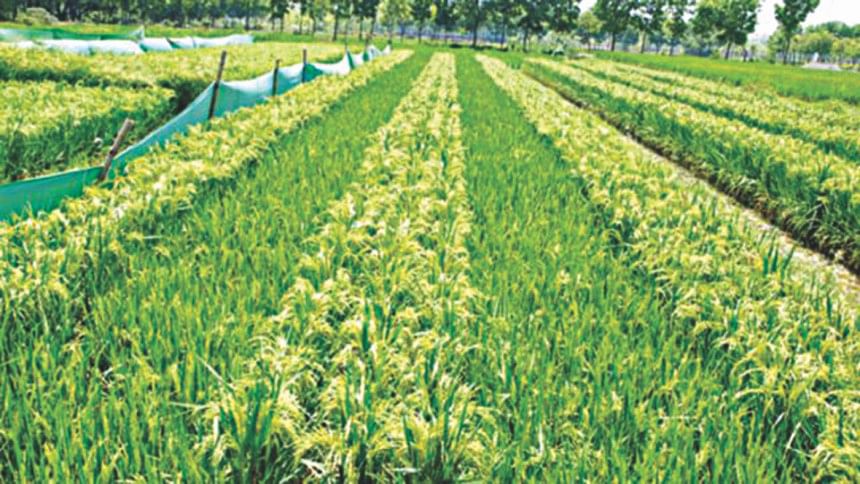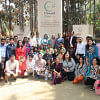The youth prioritises agriculture

Discussions about development spending and reducing Bangladesh's climate vulnerability are often dominated—understandably—by politicians and donors. These are the decision-makers who affect how funds are spent.
By way of example, the Danish government recently announced it has earmarked Tk 383 million (30 million kroner) to help Bangladesh face climate change. The lion's share, Tk 255 million (20 million kroner), will support roadworks in the district of Noakhali, while Tk 64 million (five million kroner) will go to protecting water sources, toilets and latrines from flooding. Another five million kroner has been set aside to help Dhaka to handle future climate challenges, including the "exchange of experiences" with cities in Denmark.
These priorities will, no doubt, result in greater resilience and improvements in infrastructure. But how would the most climate-vulnerable Bangladeshis themselves like this aid to be directed?
Over 2015 and 2016, the Copenhagen Consensus Center undertook an extensive research project, Bangladesh Priorities, in partnership with BRAC. We commissioned teams of dozens of specialist economists from Bangladesh, South Asia, and around the world to study 76 specific solutions to improve the future of the country, and support the government's Vision 2021 initiative.
Two volumes of academic research have just been published in Dhaka, detailing the findings. The books also present the conclusions of an eminent panel including Finn Kydland, Nobel laureate economist, Selima Ahmad, president and founder of the Bangladesh Women Chamber of Commerce and Industry, KAS Murshid, director general of the Bangladesh Institute of Development Studies, and Mushtaque Chowdhury, vice chair of BRAC. These economists were tasked with studying all of the new research and identifying the top priorities.
They concluded that there is a compelling case to invest more in three areas: tuberculosis (TB) treatment, infant nutrition, and e-governance. We have conveyed these findings to the prime minister and senior ministers in the Bangladeshi government, and we are excited to be working with the government to turn these research findings into action.
But we are also interested in hearing the voices of Bangladeshis themselves—especially young people. As Bangladesh strives to reach middle-income status by 2021, it's crucial that its young voices be heard and their concerns taken into account in policymaking and development planning. Nearly a third of the nation is between the ages of 10 and 24.
With funding from Denmark's donor organisation DANIDA, we set out to hold youth forums across Bangladesh. Presenting 25 key interventions from the research findings, we asked the youngsters to do the same as the eminent panel: Identify their top priorities for action.
The 25 interventions were selected by BRAC and Copenhagen Consensus, after consultation with the Access to Information (a2i) programme of the Prime Minister's Office (PMO) and BRAC Institute of Governance and Development (BIGD). Youth forums organised by BRAC-RED drew 730 young people from different universities across all eight divisions of Bangladesh, while another set of forums was facilitated by the Bangladesh Community Radio Station Association (BCRA) and included 214 youngsters.
Community radio stations serve the coastal regions and the majority of the climate-vulnerable communities across Bangladesh. Community radio is seen as having an important role helping to combat climate change, and the stations have been recognised as critical agents of change in climate-vulnerable areas by UNDP Bangladesh.
What we heard was a clear consensus that young people believe the top priority for Bangladesh should be boosting agricultural productivity.
This is one of the proposals studied under the topic of climate by researchers we asked to examine the smartest ways to better prepare Bangladesh for global warming. The research study found that increasing agricultural labour productivity "is the only way to increase the resilience of Bangladesh to climate change and to meet long-term development goals." Investing around Tk 729,000 (USD 9,000) per worker over two decades could boost agricultural productivity by 10 percent—meaning that each taka spent would generate a return of nearly Tk 4.
One of the students remarked, "If development aid can support climate-oriented agriculture, the youth can be influenced to work in the sector." One of the participants in the BCRA-led youth forum asked, "If we don't have food sufficiency in 2021, what will we do with Digital Bangladesh?"
The same question might be asked of other priorities. Of what use is improved infrastructure or the "exchange of experiences", if Bangladesh does not achieve food sufficiency?
Improving agricultural productivity is the best climate-related development investment that can be made, yet it is often overshadowed by more visible but less powerful "climate aid" investments.
To achieve the most we can with development spending in Bangladesh, we need to ensure that a broad range of voices are heard, including those of tomorrow's leaders.
Young people will be affected for many years to come by the decisions made today—and therefore, in the next phase of the Bangladesh Priorities project, we hope to continue working with the government, donors and international NGOs about what should be done to help make Vision 2021 a reality for the youth of Bangladesh, so that they can enjoy its fruits by 2021.
Dr Bjorn Lomborg is President of the Copenhagen Consensus Center and Visiting Professor at Copenhagen Business School.










Comments